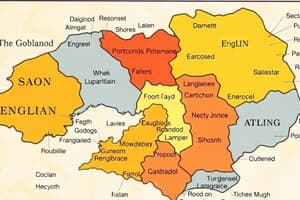Podcast
Questions and Answers
What was a major influence on Old English?
What was a major influence on Old English?
- Latin (correct)
- Italian
- French
- Spanish
Middle English emerged after the Norman Conquest.
Middle English emerged after the Norman Conquest.
True (A)
Name one regional dialect of British English.
Name one regional dialect of British English.
Cockney
The primary sentence structure in English is Subject + Verb + ______.
The primary sentence structure in English is Subject + Verb + ______.
Match the authors with their notable work or contribution:
Match the authors with their notable work or contribution:
Which of the following is a characteristic of Early Modern English?
Which of the following is a characteristic of Early Modern English?
American English and British English have no spelling differences.
American English and British English have no spelling differences.
What is the role of affixes in vocabulary development?
What is the role of affixes in vocabulary development?
English is widely regarded as a global ______.
English is widely regarded as a global ______.
Which of the following is a common method in language acquisition?
Which of the following is a common method in language acquisition?
Flashcards
Origins of English
Origins of English
English originated from the Anglo-Saxon Germanic tribes settling in Britain around the 5th century AD.
Old English
Old English
Period of English (450-1150 AD) significantly influenced by Latin and Norse languages.
Middle English
Middle English
English Period (1150-1500 AD) after the Norman Conquest, with increased French influence.
Early Modern English
Early Modern English
Signup and view all the flashcards
Modern English
Modern English
Signup and view all the flashcards
British English
British English
Signup and view all the flashcards
American English
American English
Signup and view all the flashcards
Parts of Speech
Parts of Speech
Signup and view all the flashcards
SVO Sentence Structure
SVO Sentence Structure
Signup and view all the flashcards
Tenses
Tenses
Signup and view all the flashcards
Aspects
Aspects
Signup and view all the flashcards
Roots and Affixes
Roots and Affixes
Signup and view all the flashcards
Cognates
Cognates
Signup and view all the flashcards
Word Formation
Word Formation
Signup and view all the flashcards
Vowels and Consonants
Vowels and Consonants
Signup and view all the flashcards
International Phonetic Alphabet (IPA)
International Phonetic Alphabet (IPA)
Signup and view all the flashcards
English Literature
English Literature
Signup and view all the flashcards
Global Lingua Franca
Global Lingua Franca
Signup and view all the flashcards
Language Acquisition
Language Acquisition
Signup and view all the flashcards
Standardization
Standardization
Signup and view all the flashcards
Language Learning Approaches
Language Learning Approaches
Signup and view all the flashcards
Standardized Tests (e.g., TOEFL, IELTS)
Standardized Tests (e.g., TOEFL, IELTS)
Signup and view all the flashcards
Study Notes
History of the English Language
- Origins: Derived from Germanic tribes (Anglo-Saxons) around 5th century AD.
- Old English (circa 450-1150): Heavily influenced by Latin and Norse languages.
- Middle English (circa 1150-1500): Resulted from Norman Conquest; increased French influence.
- Early Modern English (circa 1500-1700): Significant changes in grammar and vocabulary; the Great Vowel Shift occurred during this period.
- Modern English (1700-present): Continued evolution with global influences, especially from colonization and technology.
Dialects and Variants
- British English: Includes regional dialects like Cockney, Geordie, and Received Pronunciation.
- American English: Distinct spelling and vocabulary differences (e.g., color vs. colour).
- Other Variants: Australian English, Canadian English, Indian English, etc.
Grammar Essentials
- Parts of Speech: Nouns, pronouns, verbs, adjectives, adverbs, prepositions, conjunctions, interjections.
- Sentence Structure: Subject + Verb + Object (SVO) is the primary structure.
- Tense and Aspect: Present, past, and future tenses; simple, perfect, progressive aspects.
Vocabulary Development
- Roots and Affixes: Understanding prefixes and suffixes can help deduce meanings.
- Cognates: Words with a common origin (e.g., 'night' in English and 'Nacht' in German).
- Word Formation: Compounding, blending, and borrowing from other languages.
Phonetics and Phonology
- Vowels and Consonants: The distinction between voiced and voiceless sounds.
- Phonetic Transcription: Use of IPA (International Phonetic Alphabet) for pronunciation.
Literature and Influence
- Important Authors: William Shakespeare, Geoffrey Chaucer, Jane Austen, and modern writers like J.K. Rowling.
- Genres: Poetry, prose, drama; each has distinct features and historical significance.
- Impact of English Literature: Significant influence on global literature and culture.
Contemporary Use
- Global Lingua Franca: Widely spoken as a second language; essential for international business and diplomacy.
- Technology and the Internet: Influences language via social media, memes, and new vocabulary (e.g., "googling").
- Standardization: Use of grammar and style guides to maintain consistency (e.g., APA, MLA).
Learning English
- Language Acquisition: Naturalistic vs. formal methods; importance of immersion.
- Teaching Approaches: Communicative language teaching, task-based learning, and grammar-translation.
- Assessments: Standardized tests (e.g., TOEFL, IELTS) to evaluate proficiency.
History of the English Language
- English originated from Germanic tribes, specifically the Anglo-Saxons, who settled in Britain around the 5th century AD.
- Old English (450-1150 AD) was heavily influenced by Latin and Norse languages.
- The Norman Conquest in 1066 AD marked the beginning of Middle English (1150-1500 AD) and brought a significant influx of French influence.
- Early Modern English (1500-1700 AD) saw dramatic changes in grammar and vocabulary. The Great Vowel Shift, a major sound change, occurred during this period.
- Modern English (1700-present) continues to evolve, absorbing influences from globalization, colonization, and technological advancements.
Dialects and Variants
- British English encompasses various regional dialects, some of which include Cockney, Geordie, and the standard Received Pronunciation.
- American English possesses distinct spelling and vocabulary differences compared to British English, such as "color" versus "colour."
- Other English variants include Australian English, Canadian English, and Indian English.
Grammar Essentials
- English grammar consists of eight parts of speech: nouns, pronouns, verbs, adjectives, adverbs, prepositions, conjunctions, and interjections.
- The basic sentence structure in English is Subject + Verb + Object (SVO).
- English verbs are conjugated based on tense and aspect. Tense categories include present, past, and future, while aspects include simple, perfect, and progressive.
Vocabulary Development
- Understanding the roots and affixes (prefixes and suffixes) of words helps in deducing their meaning.
- Cognates, words with a common origin, exist between English and other Germanic languages, such as "night" (English) and "Nacht" (German).
- English vocabulary expands through various word formation processes, including compounding (combining words), blending (merging parts of words), and borrowing from other languages.
Phonetics and Phonology
- English sounds are classified into vowels and consonants, further categorized as voiced or voiceless.
- The International Phonetic Alphabet (IPA) is used to transcribe pronunciation.
Literature and Influence
- Notable figures in English Literature include William Shakespeare, Geoffrey Chaucer, Jane Austen, and contemporary authors such as J.K. Rowling.
- English literature comprises diverse genres such as poetry, prose, and drama, each with unique characteristics and historical significance.
- English literature has left a lasting impact on global literature and culture.
Contemporary Use
- English has become a global lingua franca, widely used as a second language, particularly in international business and diplomacy.
- Advancements in technology and the rise of the internet have influenced language evolution, particularly through social media, memes, and the emergence of new vocabulary.
- Standardization efforts, through grammar and style guides such as APA and MLA, aim to maintain consistency in written English.
Learning English
- English language acquisition can be achieved through both naturalistic (immersion) and formal methods.
- Common teaching approaches include communicative language teaching, task-based learning, and grammar-translation.
- Proficiency in English is assessed through standardized tests such as TOEFL and IELTS.
Studying That Suits You
Use AI to generate personalized quizzes and flashcards to suit your learning preferences.




